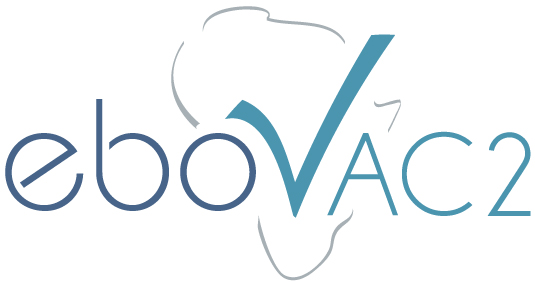Vaccine development
There are currently no licensed vaccines for Ebola. However, there are a number of vaccine candidates in development. EBOVAC 1 and 2 are two of three projects in the IMI Ebola+ programme that are generating the data needed to assess the safety and immunogenicity of different vaccine candidates and the level and duration of protection they actually offer against the disease.
Between them, the two EBOVAC projects are assessing, through clinical trials in Europe and Africa, the safety and tolerability of the ‘prime-boost’ Ebola vaccine regimen (Ad26.ZEBOV and MVA-BN-Filo) in development at the Janssen Pharmaceutical Companies of Johnson & Johnson. In a prime-boost vaccine regimen, patients are first given a dose to prime the immune system, and then a boost dose which is intended to enhance the immune response over time.
Phase I trials are carried out by the EBOVAC1 project. These trials will gather preliminary information on the safety and tolerability of the vaccine regimen. The immune response generated by the regimen will also be evaluated longer term.
Subject to review of the preliminary Phase I data, the Phase II and III trials, will be carried out in parallel by the EBOVAC2 and EBOVAC1 projects respectively to speed up the clinical development of the vaccine regimen. In these trials, larger groups of people will receive the vaccine regimen, allowing the projects to gather further information on the regimen’s safety and immunogenicity, including in specific groups such as children and the elderly, and to assess its efficacy against Ebola virus.
A part of the Ebola+ Programme
The IMI Ebola+ programme was launched in response to the Ebola virus disease (EVD) outbreak that started in western Africa in 2014. The comprehensive programme contributes to efforts to tackle a wide range of challenges in Ebola research, including vaccines development, clinical trials, and transport, as well as diagnostics. The programme complements work being carried out with the support of other funding bodies. In addition to Ebola, the programme will also address related diseases, such as Marburg.
About Ebola and related diseases
Ebola virus disease (EVD), previously known as Ebola haemorrhagic fever, is a rare and deadly disease caused by infection with one of the Ebola virus strains. The virus spreads in the human population through direct human-to-human contact with the bodily fluids of infected patients who are showing symptoms. It has an incubation period of 2-21 days, and it usually begins with flu-like symptoms, but rapidly progresses to multiple organ failure and blood-clotting abnormalities which manifest as internal and external haemorrhages (bleeding). It is fatal in between 25% and 90% of cases. There is currently no licensed treatment against EVD, and the development of treatments and preventive measures such as vaccines is hampered by challenges including manufacturing-related hurdles, the stability of vaccines during transport and storage, vaccine deployment, and the time taken to diagnose cases of EVD.
Ebola is a member of the filovirus family of viruses, which also includes Marburg virus. Like Ebola, Marburg causes cause severe, often fatal haemorrhagic fever in humans and other primates (monkeys, gorillas and chimpanzees), and like Ebola, it is transmitted directly from one person to another. (In contrast, other viruses that cause haemorrhagic fevers are spread via intermediate hosts - for example, dengue fever is transmitted by mosquitoes.) There is no specific treatment or vaccine against Marburg haemorrhagic fever.
The 2014-15 Ebola epidemic was unprecedented in its scale and geographical distribution. By the middle of 2015, World Health Organization (WHO) statistics recorded over 27 000 cases and 11 000 deaths from the disease, most of them in Guinea, Liberia, and Sierra Leone. The epidemic highlighted the need for research into better vaccines, diagnostics and treatments to stop future epidemics in their tracks.

